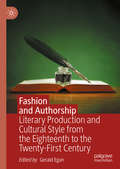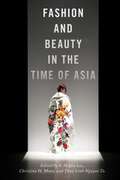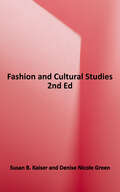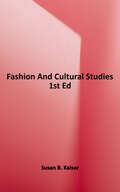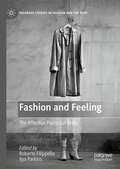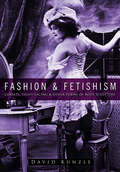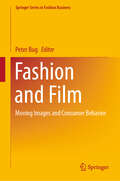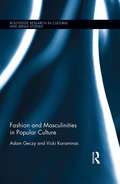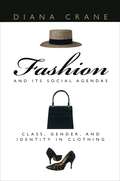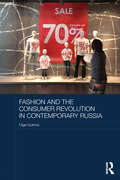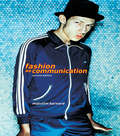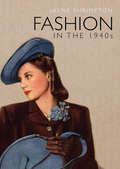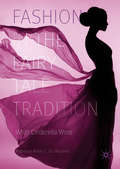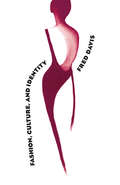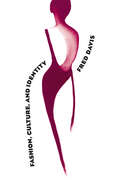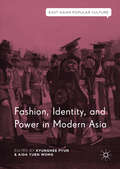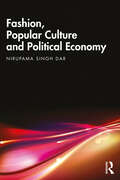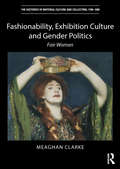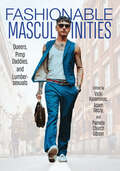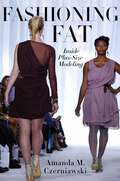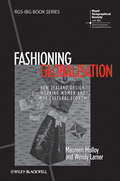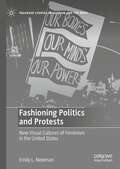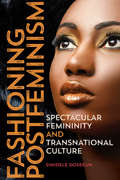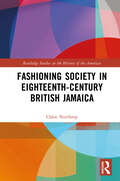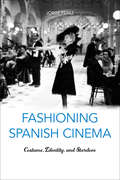- Table View
- List View
Fashion and Authorship: Literary Production and Cultural Style from the Eighteenth to the Twenty-First Century (Palgrave Studies In The Enlightenment, Romanticism And Cultures Of Print Ser.)
by Gerald EganStudies of fashion and literature in recent decades have focused primarily onrepresentations of clothing and dress within literary texts. But what about theauthor? How did he dress? What where her shopping practices and predilections?What were his alliances with modishness, stylishness, fashion? The essays in thisbook explore these and other questions as they look at authors from theeighteenth century through the postmodern and digital eras, cultural producerswho were also men and women of fashion: Alexander Pope, Hester Thrale, MaryRobinson, Lord Byron, William Thackeray, Charlotte Bronte, Wilkie Collins,Margaret Oliphant, Virginia Woolf, Rebecca West, Trudi Kanter, Angela Carter,and Martin Margiela. The essays collected here ultimately converge upon afundamental question: what happens to our notions of timeless literature whenauthorship itself is implicated in the transient and the temporary, the cycles andmaterials of fashion?“Gerald Egan’s provocative introduction to this exciting new book poses a boldquestion: How are authorship and literature – so often linked to ideas oftranscendence – implicated in the transient trends and stuff of fashion? Thethirteen chapters that follow track authorship’s complex implication in thediscourses and materiality of fashion and fashionable goods from the eighteenthto the twentieth centuries. Wide-ranging in discipline and chronology, yetforensically focused and carefully argued, this book makes a striking andwonderfully original contribution to studies of authorship, celebrity and materialculture.”— Dr Jennie Batchelor, Professor of Eighteenth-Century Studies,University of Kent, UK
Fashion and Beauty in the Time of Asia (NYU Series in Social and Cultural Analysis #6)
by S. Heijin Lee, Christina H. Moon, and Thuy Linh Nguyen TuHow transnational modernity is taking shape in and in relation to AsiaFashion and Beauty in the Time of Asia considers the role of bodily aesthetics in the shaping of Asian modernities and the formation of the so-called “Asian Century.” S. Heijin Lee, Christina H. Moon, and Thuy Linh Nguyen Tu train our eyes on sites as far-flung, varied, and intimate as Guangzhou and Los Angeles, Saigon and Seoul, New York and Toronto. They map the transregional connections, ever-evolving aspirations and sensibilities, and new worlds and life paths forged through engagements with fashion and beauty.Contributors consider American influence on plastic surgery in Korea, Vietnamese debates about “the fashionable,” and the costs and commitments demanded of those who make and wear fast fashion, from Chinese garment workers to Nepalese nail technicians in New York who are mandated to dress "fashionably." In doing so, this interdisciplinary anthology moves beyond common characterizations of Asians and the Asian diaspora as simply abject laborers or frenzied consumers, analyzing who the modern Asian subject is now: what they wear and how they work, move, eat, and shop.
Fashion and Cultural Studies
by Susan B. Kaiser Denise N. GreenBridging theory and practice, this accessible text considers fashion from both cultural studies and fashion studies perspectives and addresses the growing interaction between the two fields. Kaiser and Green use a wide range of cross-cultural case studies to explore how race, ethnicity, class, gender and other identities intersect and are produced through embodied fashion. Drawing on intersectionality in feminist theory and cultural studies, Fashion and Cultural Studies is essential reading for students and scholars. <p><p>This revised edition includes updated case studies and two new chapters. The first new chapter explores religion, spirituality, and faith in relation to style, fashion, and dress. The second offers a critique of "beauty" and considers dressed embodiment inclusive of diverse sizes, shapes and dis/abilities. Throughout the text, Kaiser and Green use various examples to interrogate the complex entanglements of production, regulation, distribution, consumption, and subject formation within and through fashion.
Fashion and Cultural Studies
by Susan B. KaiserThis book addresses the growing interaction between the two fields. Bridging theory and practice, it draws on cultural diversity in fashion, dress, and style in the context of globalization and its varied cultural-historical underpinnings. The premise is that cultural studies rely on fashion to visualize and materialize change as well as continuity, in addition to negotiations between time and space, identity and difference, agency and structure, and production and consumption. At the same time, fashion benefits from the interpretative lens of cultural studies- its key concepts, its contextual flexibility, and its attention to bridging 'high' and 'popular' culture, contemporary and historical perspectives, and diverse identity issues and methodologies. <p><p>While the book is organized around specific subjects, such as ethnicity, class, gender, and nation, the overall goal is to highlight the ways in which these interact and overlap. Intersections are a key theme- drawing on intersectionality theory in feminist theory and cultural studies, Fashion and Cultural Studies explores how fashion makes meaning in everyday life through the production, distribution, and consumption of materials. A wide range of cross-cultural case studies analyze fashion as a multi-ethnic, transnational, and multiply gendered, classed, and sexualized phenomenon.
Fashion and Feeling: The Affective Politics of Dress (Palgrave Studies in Fashion and the Body)
by Ilya Parkins Roberto FilippelloFashion and Feeling: The Affective Politics of Dress explores the complex nexus of fashion and the feeling body from a variety of critical perspectives across fashion studies, anthropology, sociology, design practice, and media studies. It asks such questions as: What does fashion look and feel like in an age dominated by amplified anxiety, isolation, depression, and precariousness? How are feelings woven into clothing and mobilized through fashion practices in ways that might sustain living with a sense of ongoing crisis? Does fashion have the potential to help us reimagine new lifeworlds which might be reinvigorating? In other words, how is fashion engaging with the “bad,” the “good,” and the ambivalent feelings associated with our personal and collective histories, with our troubled political present, and with our imagined future? Despite such diverse and scattered contributions, the potentialities of “feeling” for the study of fashion are still largely neglected. This edited volume seeks to tease out possible avenues of investigation of the clothed body and its representations through the lens of feeling.
Fashion and Fetishism: Corsets, Tight-Lacing and Other Forms of Body-Sculpture
by David KunzlePresenting the history of corsetry and body sculpture, this edition shows how the relationship between fashion and sex is closely bound up with sexual self-expression. It demonstrates how the use of the corset rejected the role of the passive, maternal woman, so that in Victorian times it was seen as a scandalous threat to the social order.
Fashion and Film: Moving Images and Consumer Behavior (Springer Series in Fashion Business)
by Peter BugThis book aims to explore various aspects of the use of moving images in fashion retail and fashion apparel companies in-store or online. The use of moving images is growing in numbers and in relevance for consumers. Films can be used in various forms by fashion businesses in traditional media like cinema or TV and in modern forms like in social media or moving images in high street stores.The book provides a data-oriented analysis of the state-of-the-art with certain future outlooks. Additional areas of covering fashion in moving images, such as ‘fashion company identity films’ or ‘fashion and music videos’ are covered in order to get a more complete analysis from a consumer influenced perspective.
Fashion and Masculinities in Popular Culture (Routledge Research in Cultural and Media Studies)
by Adam Geczy Vicki KaraminasPopular culture in the latter half of the twentieth century precipitated a decisive change in style and body image. Postwar film, television, radio shows, pulp fiction and comics placed heroic types firmly within public consciousness. This book concentrates on these heroic male types as they have evolved from the postwar era and their relationship to fashion to the present day. As well as demonstrating the role of male icons in contemporary society, this book’s originality also lies in showing the many gender slippages that these icons help to effect or expose. It is by exploring the somewhat inviolate types accorded to contemporary masculinity that we see the very fragility of a stable or rounded male identity.
Fashion and its Social Agendas
by Diana CraneIt has long been said that clothes make the man (or woman), but is it still true today? If so, how has the information clothes convey changed over the years? Using a wide range of historical and contemporary materials, Diana Crane demonstrates how the social significance of clothing has been transformed. Crane compares nineteenth-century societies—France and the United States—where social class was the most salient aspect of social identity signified in clothing with late twentieth-century America, where lifestyle, gender, sexual orientation, age, and ethnicity are more meaningful to individuals in constructing their wardrobes. Today, clothes worn at work signify social class, but leisure clothes convey meanings ranging from trite to political. In today's multicode societies, clothes inhibit as well as facilitate communication between highly fragmented social groups. Crane extends her comparison by showing how nineteenth-century French designers created fashions that suited lifestyles of Paris elites but that were also widely adopted outside France. By contrast, today's designers operate in a global marketplace, shaped by television, film, and popular music. No longer confined to elites, trendsetters are drawn from many social groups, and most trends have short trajectories. To assess the impact of fashion on women, Crane uses voices of college-aged and middle-aged women who took part in focus groups. These discussions yield fascinating information about women's perceptions of female identity and sexuality in the fashion industry. An absorbing work, Fashion and Its Social Agendas stands out as a critical study of gender, fashion, and consumer culture. "Why do people dress the way they do? How does clothing contribute to a person's identity as a man or woman, as a white-collar professional or blue-collar worker, as a preppie, yuppie, or nerd? How is it that dress no longer denotes social class so much as lifestyle? . . . Intelligent and informative, [this] book proposes thoughtful answers to some of these questions. "-Library Journal
Fashion and the Consumer Revolution in Contemporary Russia: Institutions, Identities And Everyday Life (Routledge Contemporary Russia and Eastern Europe Series)
by Olga GurovaThis book explores how clothing consumption has changed in Russia in the past 20 years as capitalism has grown in a postsocialist state, bringing with it a "consumer revolution." It shows how there has been and continues to be a massive change in the fashion retail market and how ideal lifestyles portrayed in glossy magazines and other media have contributed to the consumer revolution, as have shifts in the social structure and everyday life. Overall, the book, which includes the findings of extensive original research, including in-depth interviews with consumers, relates changes in fashion and retail to changing outlooks, identities, and ideologies in Russia more generally. The mentioned changes are also linked to the theoretical concept of fashion formed in postsocialist society.
Fashion as Communication
by Malcolm BarnardWhat kinds of things do fashion and clothing say about us? What does it mean to wear Gap or Gaultier, Milletts or Moschino? Are there any real differences between Hip-Hop style and Punk anti-styles? In this fully revised and updated edition, Malcolm Barnard introduces fashion and clothing as ways of communicating and challenging class, gender, sexual and social identities.Drawing on a range of theoretical approaches from Barthes and Baudrillard to Marxist, psychoanalytic and feminist theory, Barnard addresses the ambivalent status of fashion in contemporary culture.
Fashion in the 1940s
by Jayne ShrimptonThis book reveals the impact of wartime on British fashion, how a spirit of utility, make-do and mend unleashed a whole new creativity among Britain's women starved of high fashion by rationing. Many of these home dressmakers copied the high-end looks. Women doing war work created new street fashion looks. It also shows how world war shifted the centre of the international fashion from Paris to New York and established a casual American style for British women and men. Finally, we see the re-birth of Paris fashion in Dior's New Look and a new glamour.
Fashion in the Fairy Tale Tradition: What Cinderella Wore
by Rebecca-Anne C. Do RozarioThis book is a journey through the fairy-tale wardrobe, explaining how the mercurial nature of fashion has shaped and transformed the Western fairy-tale tradition. Many of fairy tale’s most iconic images are items of dress: the glass slippers, the red capes, the gowns shining like the sun, and the red shoes. The material cultures from which these items have been conjured reveal the histories of patronage, political intrigue, class privilege, and sexual politics behind the most famous fairy tales. The book not only reveals the sartorial truths behind Cinderella’s lost slippers, but reveals the networks of female power woven into fairy tale itself.
Fashion, Culture, and Identity (Emersion: Emergent Village Resources For Communities Of Faith Ser.)
by Fred DavisWhat do our clothes say about who we are or who we think we are? How does the way we dress communicate messages about our identity? Is the desire to be "in fashion" universal, or is it unique to Western culture? How do fashions change? These are just a few of the intriguing questions Fred Davis sets out to answer in this provocative look at what we do with our clothes—and what they can do to us. Much of what we assume to be individual preference, Davis shows, really reflects deeper social and cultural forces. Ours is an ambivalent social world, characterized by tensions over gender roles, social status, and the expression of sexuality. Predicting what people will wear becomes a risky gamble when the link between private self and public persona can be so unstable.
Fashion, Culture, and Identity (Emersion: Emergent Village Resources For Communities Of Faith Ser.)
by Fred DavisWhat do our clothes say about who we are or who we think we are? How does the way we dress communicate messages about our identity? Is the desire to be "in fashion" universal, or is it unique to Western culture? How do fashions change? These are just a few of the intriguing questions Fred Davis sets out to answer in this provocative look at what we do with our clothes—and what they can do to us. Much of what we assume to be individual preference, Davis shows, really reflects deeper social and cultural forces. Ours is an ambivalent social world, characterized by tensions over gender roles, social status, and the expression of sexuality. Predicting what people will wear becomes a risky gamble when the link between private self and public persona can be so unstable.
Fashion, Identity, and Power in Modern Asia (East Asian Popular Culture)
by Kyunghee Pyun Aida Yuen WongThis edited volume on radical dress reforms in East Asia takes a fresh look at the symbols and languages of modernity in dress and body. Dress reform movements around the turn of the twentieth century in the region have received little critical attention as a multicultural discourse of labor, body, gender identity, colonialism, and government authority. With contributions by leading experts of costume/textile history of China, Korea, and Japan, this book presents up-to-date scholarship using diverse methodologies in costume history, history of consumption, and international trade. Thematically organized into sections exploring the garments and uniforms, accessories, fabrics, and fashion styles of Asia, this edited volume offers case studies for students and scholars in an ever-expanding field of material culture including, but not limited to, economic history, visual culture, art history, history of journalism, and popular culture. Fashion, Identity, and Power in Modern Asia stimulates further research on the impact of modernity and imperialism in neglected areas such as military uniform, school uniform, women’s accessories, hairstyles, and textile trade.
Fashion, Popular Culture and Political Economy
by Nirupama Singh DarThis book delves into the intricate interplay of political, economic, and philosophic forces that have shaped popular culture, fashion, social movements and societies. Exploring the developments of the twentieth century and the transition into the new millennium, this work traces the causality between culture, fashion, philosophical discourses, and political economy. It analyzes political-economic and philosophical factors to demonstrate how fashion emerges as a pivotal force that guides and shapes post-modern democratic societies and market economies.The volume weaves together insights from sociology, cultural studies, feminist studies, fashion history, cinematography, media, the entertainment industry and social policy research. It examines how postmodern societies, shaped by post-structuralist critique and neo-liberal ideologies, navigates the complexities of democracy and market economies, evolving from deeply entrenched systems of colonialism and feudalism to achieve modernization and massive technological progress and reach a social reality of postmodernist paradigms.Topical and lucid, this invigorating work shows how fashion leads to social engineering. It will be of interest to scholars and researchers of fashion studies, popular culture, cultural studies, sociology, gender studies, political economy and political studies. This book also provides valuable perspectives for policymakers, film critics, women's rights groups, social policy researchers, film censor boards and journalists.
Fashionability, Exhibition Culture and Gender Politics: Fair Women (The Histories of Material Culture and Collecting, 1700-1950)
by Meaghan ClarkeFair Women was the Victorian equivalent of a ‘blockbuster’ exhibition. Organised by a committee of women, it opened to great fanfare in the Grafton Galleries in London, and was comprised of both historical and contemporary portraits of women as well as decorative objects. Meaghan Clarke argues that the exhibition challenged contemporary assumptions about the representation of women and the superficiality of female collectors. The Fair Women phenomenon complicated gender stereotypes and foregrounded women as cultural arbiters. This book uncovers a wide range of texts and images to reveal that Fair Women brought together fashion, modernity and gender politics in new and surprising ways. It shows that, while invariably absent in institutional histories, women were vital to the development of the modern blockbuster exhibition. This book will be of interest to scholars in art and gender studies, museum studies, feminist art history, women artists and art history.
Fashionable Masculinities: Queers, Pimp Daddies, and Lumbersexuals
by Anne Peirson-Smith Adam Geczy Pamela Church Gibson Vlad Strukov Andrew Reilly Barry Judd Vicki Karaminas Shaun Cole Jennifer Craik Jay McCauley Bowstead Ben Barry Michael McMillan Justine Taylor Nigel Lezama Jonathan Allan Nikita Vanderbyl Olga Vainshtein Victor VeyFashionable Masculinities explores the expression of masculinities through constructions of fashion, identity, style and appearance as the third decade of the new millennium begins: a contradictory and precarious moment when masculinities are defined by protests and pandemics whilst being problematized across class, ethnicity, race, gender and sexuality. Whilst a majority of men might still define themselves as ‘traditional,’ post-millennials are now talking about how they envision a future without gender boundaries and borders. Rather than being defined as a gender, masculinity has now become a style that can be worn and performed as traditional and normative codes of masculinity are modulated and manipulated. This volume includes original essays on musical pop sensation Harry Styles, rapper and producer “Puff Daddy” Sean Combs, lumbersexuals, spornosexuals, sexy daddies, and aging cool black daddies. Bringing together contributions from leading scholars, this book interrogates and challenges the meaning of masculinities and the ways that they are experienced and lived.
Fashioning Fat: Inside Plus-Size Modeling
by Amanda M. CzerniawskiFor two and a half years, Amanda Czerniawski was a sociologist turned plus-size model. Journeying into a world where, as a size 10, she was not considered an average body type, but rather, for the fashion industry, “plus-sized,” Czerniawski studied the standards of work and image production in the plus-sized model industry.Fashioning Fat takes us through a model’s day-to-day activities, first at open calls at modeling agencies and then through the fashion shows and photo shoots. Czerniawski also interviewed 35 plus size models about their lives in the world of fashion, bringing to life the strange contradictions of being an object of non-idealized beauty.Fashioning Fat shows us that the mission of many of these models is to challenge our standards of beauty that privilege the thin body; they show us that fat can be sexy. Many plus-size models do often succeed in overcoming years of self-loathing and shame over their bodies, yet, as Czerniawski shows, these women are not the ones in charge of beauty’s construction or dissemination. At the corporate level, the fashion industry perpetuates their objectification. Plus-size models must conform to an image created by fashion’s tastemakers, as their bodies must fit within narrowly defined parameters of size and shape—an experience not too different from that of straight-sized models. Ultimately, plus-size models find that they are still molding their bodies to fit an image instead of molding an image of beauty to fit their bodies. A much-needed behind-the-scenes look at this growing industry, Fashioning Fat is a fascinating, unique, and important contribution to our understanding of beauty.
Fashioning Globalisation: New Zealand Design, Working Women and the Cultural Economy (RGS-IBG Book Series)
by Maureen Molloy Wendy LarnerDrastic changes in the career aspirations of women in the developed world have resulted in a new, globalised market for off-the-peg designer clothes created by independent artisans. This book reports on a phenomenon that seems to exemplify the twin imperatives of globalisation and female emancipation. A major conceptual contribution to the literatures on globalisation, fashion and gender, analysing the ways in which women’s entry into the labour force over the past thirty years in the developed world has underpinned new forms of aestheticised production and consumption as well as the growth of ‘work-style’ businesses A vital contribution to the burgeoning literature on culture and creative industries which often ignores the significant roles taken by women as entrepreneurs and designers rather than mere consumers Introduces fashion scholars and economic geographers to a paradigmatic example of the new designer fashion industries emerging in a range of countries not traditionally associated with fashion Takes a fresh perspective on an industry in which Third World garment workers have been the subject of exhaustive analysis but first world women have been largely ignored
Fashioning Politics and Protests: New Visual Cultures of Feminism in the United States (Palgrave Studies in Fashion and the Body)
by Emily L. NewmanThrough meticulous examinations, this book analyzes how women update their identities and articulate their feelings through clothing and art in protests, politics in the United States in the 20th century. Topics explored include the suffragists and their impact on contemporary art, the significance of the red dress in both The Handmaid’s Tale and the Missing and Murdered Indigenous Women movement, the impact of the Miss America protests, the rising popularity of the pantsuit for women, the recent dominance of the pussyhat, and the way that feminist slogans are disseminated on t-shirts. Movements discussed include craftivism, hashtag culture, feminism, the CROWN act, Pantsuit Nation, socially-committed stores, and more. Interdisciplinary and intersectional at its core, addressing numerous areas, including fashion, sociology, visual culture, art history, feminism, and popular culture; Fashioning Politics and Protests uncovers how women continue to use visual means, explored via their clothing, to change the world.
Fashioning Postfeminism: Spectacular Femininity and Transnational Culture (Dissident Feminisms #33)
by Simidele DosekunWomen in Lagos, Nigeria, practice a spectacularly feminine form of black beauty. From cascading hair extensions to immaculate makeup to high heels, their style permeates both day-to-day life and media representations of women not only in a swatch of Africa but across an increasingly globalized world. Simidele Dosekun's interviews and critical analysis consider the female subjectivities these women are performing and desiring. She finds that the women embody the postfeminist idea that their unapologetically immaculate beauty signals—but also constitutes—feminine power. As empowered global consumers and media citizens, the women deny any need to critique their culture or to take part in feminism's collective political struggle. Throughout, Dosekun unearths evocative details around the practical challenges to attaining their style, examines the gap between how others view these women and how they view themselves, and engages with ideas about postfeminist self-fashioning and subjectivity across cultures and class. Intellectually provocative and rich with theory, Fashioning Postfeminism reveals why women choose to live, embody, and even suffer for a fascinating performative culture.
Fashioning Society in Eighteenth-Century British Jamaica (Routledge Studies in the History of the Americas)
by Chloe NorthropWhite women who inhabited the West Indies in the eighteenth century fascinated metropolitan observers. In popular prints, novels, and serial publications, these women appeared to stray from "proper" British societal norms. Although many women who lived in the Caribbean island of Jamaica might have fit the model, extant writings from Ann Brodbelt, Sarah Dwarris, Margaret and Mary Cowper, Lady Maria Nugent, and Ann Appleton Storrow show a longing to remain connected with metropolitan society and their loved ones separated by the Atlantic. Sensibility and awareness of metropolitan material culture masked a lack of empathy towards subordinates and opened the white women in these islands to censure. Novels and popular publications portrayed white women in the Caribbean as prone to overconsumption, but these women seem to prize items not for their inherent value. They treasured items most when they came from beloved connections. This colonial interchange forged and preserved bonds with loved ones and comforted the women in the West Indies during their residence in these sugar plantation islands. This book seeks to complicate the stereotype of insensibility and overconsumption that characterized the perception of white women who inhabited the British West Indies in the long eighteenth century. This book will appeal to students and researchers alike who are interested in the social and cultural history of British Jamacia and the British West Indies more generally.
Fashioning Spanish Cinema: Costume, Identity, and Stardom (Toronto Iberic)
by Jorge PérezCostume design is a crucial, but frequently overlooked, aspect of film that fosters an appreciation of the diverse ways in which film and fashion enrich each other. These influential industries offer representations of ideas, values, and beliefs that shape and construct cultural identities. In Fashioning Spanish Cinema, Jorge Pérez analyses the use of clothing and fashion as costumes within Spanish cinema, paying particular attention to the significance of those costumes in relation to the visual styles and the narratives of the films. The author examines the links between costume analysis and other fields and theoretical frameworks such as fashion studies, the history of dress, celebrity studies, and gender and feminist studies. Fashioning Spanish Cinema looks at instances in which costumes are essential to shaping the public image of stars, such as Conchita Montenegro, Sara Montiel, Victoria Abril, and Penélope Cruz. Focusing on examples in which costumes have discursive autonomy, it explores how costumes engage with broader issues of identity and, relatedly, how costumes impact everyday practices and fashion trends beyond cinema. Drawing on case studies from multiple periods, films by contemporary directors and genres, and red-carpet events such as the Oscars and Goya Awards, Fashioning Spanish Cinema contributes a pivotal Spanish perspective to expanding interdisciplinary work on the intersections between film and fashion.
